June 19, 2025 | 18:01 GMT +7
June 19, 2025 | 18:01 GMT +7
Hotline: 0913.378.918
June 19, 2025 | 18:01 GMT +7
Hotline: 0913.378.918
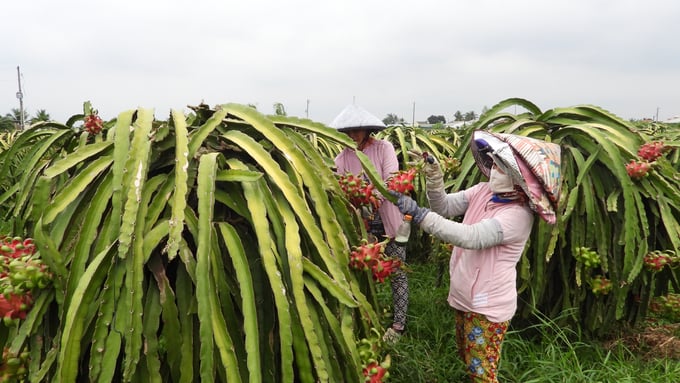
Long An dragon fruit growers proactively produce cleanly, meeting international standards. Photo: Tran Trung.
Coming to Chau Thanh district these days, people here are busy re-cultivating abandoned areas and focusing on taking care of commercial gardens to recover in time after the crop season to enter the off-season), preparing to welcome the wave of imports from international markets.
We visited the green GlobalGAP dragon fruit garden of Mr. Tran Van Toan in Hiep Thanh commune while he was urgently installing light bulbs to prepare for the upcoming crop. Mr. Toan excitedly said that thanks to his participation in Van Thanh Cooperative, his family's 0.6-hectare garden was granted a Production Unit Code. Last season, although the price of dragon fruit fluctuated, he still received a Production Unit Code. The cooperative covers consumption at a stable price of VND 8,000/kg.
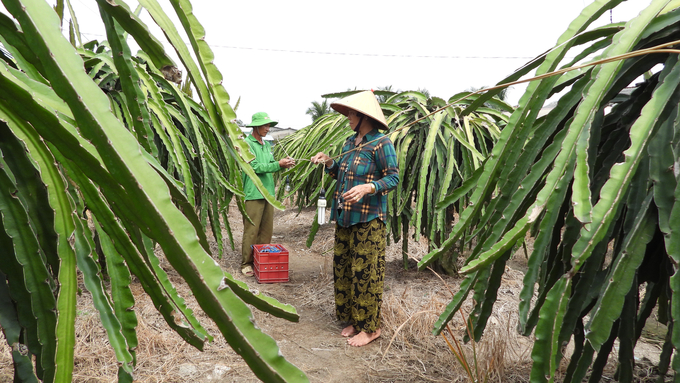
Mr. Tran Van Toan's family urgently turned on the lights for the off-season. Photo: Tran Trung.
Mr. Nguyen Van Thanh, Chairman of the Board of Directors of Van Thanh Cooperative, added that after China closed its borders to prevent the COVID-19 epidemic. At the same time, dragon fruit growers struggled to find outlets. The cooperative realized that to escape the vicious circle of "planting - chopping, cutting - planting" and to survive, cooperatives must restructure production according to clean processes and international standards to meet increasingly strict market requirements. To date, the cooperative has over 120 members, with 150 hectares of dragon fruit certified by GlobalGAP and 50 hectares of dragon fruit certified by VietGAP.
Thanks to an early change in perception, when the Chinese market opened, China made many changes in the management of food safety and biosecurity for imported agricultural products, the latest being the regulations in Decrees 248 and 249. The Cooperative meets all set criteria and is one of the first cooperatives to be granted Production Unit Code to export to China. In addition, the cooperative's white-flesh dragon fruits are also accepted by the Japanese and EU markets.
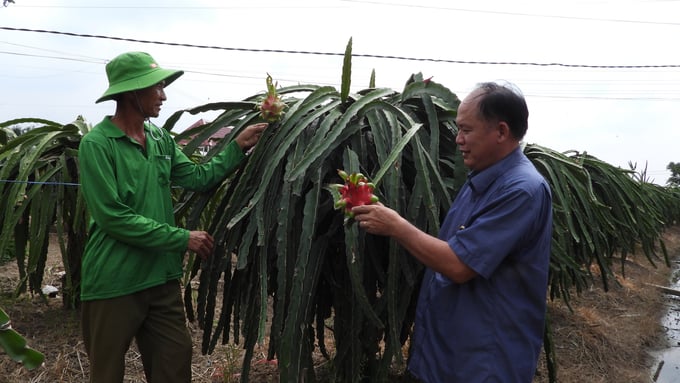
Mr. Nguyen Van Thanh (right cover) instructs cooperative members to care for dragon fruits according to GlobalGAP's direction. Photo: Tran Trung.
According to Mr. Nguyen Van Khai, Chairman of Chau Thanh District People's Committee, Chau Thanh currently has more than 8,900 hectares of dragon fruit. For sustainable development, localities and functional branches of the province encourage dragon fruit growers to produce according to clean processes to improve the quality and value of dragon fruit to increase competitiveness and meet standards for export.
Along with the initiative of growers, businesses in the dragon fruit industry also soon grasped regulations to officially export dragon fruits, aiming for sustainable production and consumption. Among them, Hoang Phat Fruit Company Limited is one of the pioneers. Besides traditional markets, the Company also exports red and white dragon fruits to Korea, Japan, Australia, America, and Europe.
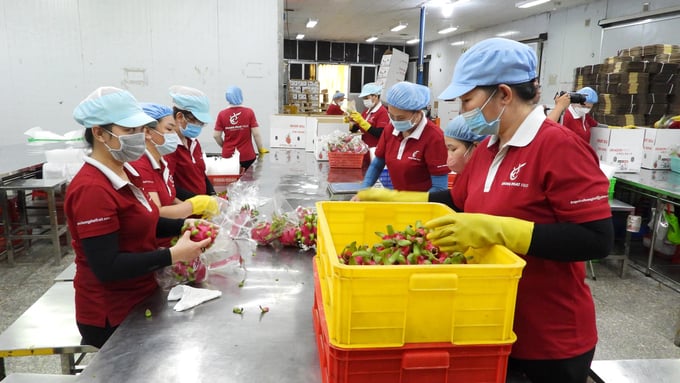
Hoang Phat Fruit Co., Ltd. urgently prepares dragon fruits for export. Photo: Tran Trung.
According to Mr. Nguyen Khac Huy, Director of Hoang Phat Fruit Co., Ltd., China is no longer an easy-going market. They require quality standards and safety certification... no less than Japan and Korea. As soon as China imposed new regulations, especially Decree 249, focusing on tightening the management of imported and exported food safety and controlling the entire production, processing, and product creation process, the Company quickly grasped and adapted. The proof is that the Company's shipments are still exported regularly throughout its operation.
From practical experience, Mr. Huy believes that to export sustainably. First, a stable raw material area must be granted the Production Unit Code. Since then, the Company has proactively invested in building raw material areas that meet international standards as a basis for transferring scientific and technical advances, supporting cooperatives in the link chain to make area codes. At the same time, the Company proactively innovates post-harvest pre-processing and preservation technology, helping dragon fruits stay fresh and ensuring compliance with international standards, especially plant quarantine.
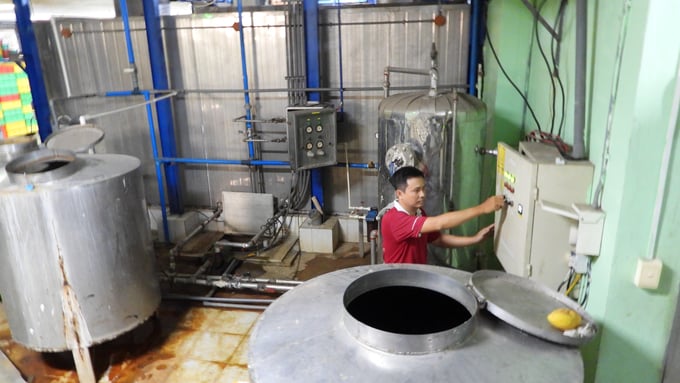
Hoang Phat Fruit is one of four leading companies in Vietnam using hot steam technology to preserve agricultural products that meet international standards. Photo: Tran Trung.
Accordingly, the Company always maintains and improves the quality management system according to ISO 2000 standards: HACCP, GLOBAL GAP, SMETA SEDEX... In particular, Hoang Phat Fruit is currently one of the four leading companies in Vietnam. Using hot steam technology to kill maximum pathogens without damaging the freshness of dragon fruit. That has helped Hoang Phat Fruit's products qualify for packaging and export to markets famous for their fastidiousness, such as Japan, Korea, Australia...
Since the end of 2021, China has issued Order 248 on Regulations on the management of registration of imported foreign food production enterprises and Order 249 on Measures for safety management of imported and exported food, causing a lot of pressure for the export of agricultural products in general and dragon fruit in particular. To solve difficulties caused by China's Decrees 248 and 249, the Association has coordinated with the Department of Crop Production and Plant Protection to implement regulations on food safety, plant quarantine, and procedures for establishing and supervising the plant close to growing areas and packaging facilities, and manage Production Unit Code for localities. After an initial period of confusion, most businesses, cooperatives, and dragon fruit growers have mastered the requirements set by China to help the local dragon fruit industry recover positively.
Translated by Tuan Huy

(VAN) The waste of resources from agricultural by-products and the situation of counterfeit and poor quality goods in production causing losses of thousands of billions were pointed out by the National Assembly deputy.

(VAN) After 5 years of implementation, the CAI initiative has helped coffee growers change their farming practices, moving toward responsible agriculture that meets global export standards.

(VAN) The primary prerequisite for the comprehensive and robust integration of Vietnam's livestock sector into the global value chain is the establishment of a disease control system.

(VAN) The results of national programs are essential for establishing a contemporary livestock sector that is well-equipped to meet the demands of both domestic and international markets, with robust biosafety standards.

(VAN) The UNESCO Global Geopark revalidation of Non nuoc Cao Bang and the transition to a two-tier administrative model are presently undergoing a pivotal moment in Cao Bang, the northernmost province of Vietnam.
/2025/06/13/5330-2-004539_953.jpg)
(VAN) Changing policy mindset and removing investment barriers are urgent requirements to open up new development space for enterprises in the agricultural sector.

(VAN) The areas include the restoration of five million hectares of marine ecosystems.